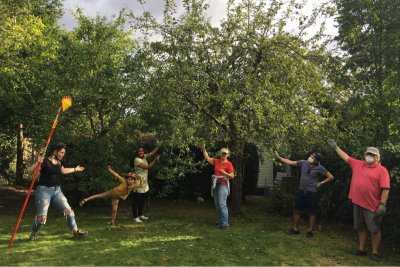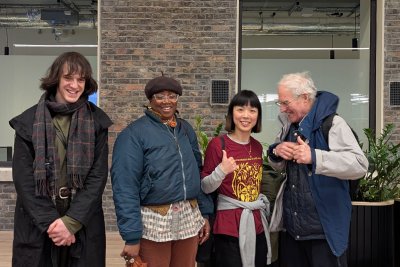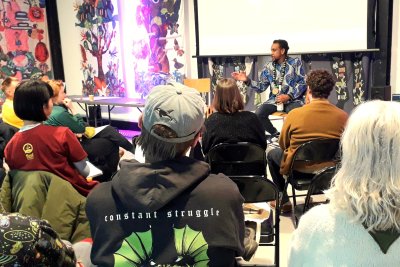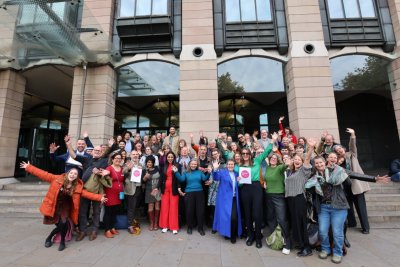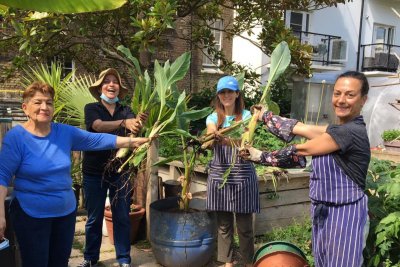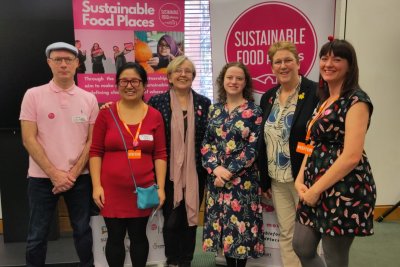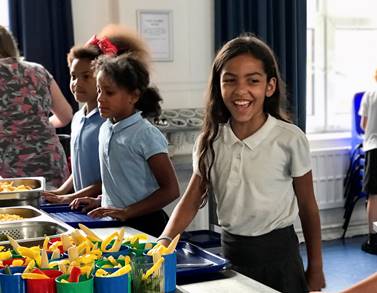 Power Pots trialed at Brighton & Hove school. Credit: BHFP
Power Pots trialed at Brighton & Hove school. Credit: BHFP

Crunchy success – inspiring pupils to eat more vegetables in school meals
A trial of ‘Power Pots' – raw vegetables served in colourful beakers and supported by clever marketing materials and activities – was positively received by pupils in Brighton.
Brighton and Hove City Council’s Primary School Meals Service serve 11,500 meals across 64 primary schools. Children choose from two hot options daily which are cooked from scratch. The children are served two 35g portions of veg with every meal plus access to a salad bar – so they already meet the target of two portions of veg in every meal. In 2017 they asked Brighton and Hove Food Partnership (BHFP) to find out how much, what and why food was being wasted in school meals. Audits in schools revealed that vegetables were the most wasted type of food and the reasons behind it were mostly around the way they were cooked and the type of vegetable.
Based on the findings of the food waste audits, the food partnership made a number of recommendations and the Brighton & Hove City Council Primary School Meals Service and the caterer at the time pledged to:
- Trial raw veg
- Promote “Eat a Rainbow” message
- Commitment to increase consumption of vegetables, rather than just increase number of portions available, with a target to reduce food waste.
In 2018, BHFP went back to one school to trial a ‘Powered by veg’ pilot with the objective of increasing vegetable consumption and lower food waste.
Prior to the interventions taking place, posters of the Veg Power winning advert were put up around the dining halls without explanation to create interest and potentially ‘nudge’ the pupils into choosing the pots the following week.
Power Pots – beakers containing 70grs of raw veg were introduced. They contained a single vegetable in the first week and mixed vegetables the weeks after. Pupils’ reactions were observed, food waste weighted and pupils who had a power pot got a sticker reward.
A focus group was held with School Council pupils: an interactive session teasing what vegetables they eat at home, what they eat at school and what they thought of the Power Pots.
The message was taken home to parents and carers via different stickers for every day of the three week pilot and a paper survey sent home in book bags with questions regarding what they thought of the Power Pots and asking recommendations for what they’d like to see in the future.
On the last day of the pilot (and school term) there was some fun activity to further engage the pupils. BHFP ran a Veg Power photo booth set up in the playground where everyone got to have their photo taken, striking a Veg Power pose with their friends and taking a strip of photos home to show their parents.
The results of the trial were promising. Most children tried a Power Pot and the feedback was largely positive. Over 2/3 of pupils said they preferred raw to cooked vegetables. The most preferred option was a single vegetable they could choose from, rather than mixed. The most popular vegetables were sugar snap peas and carrots. There was only a slight reduction in waste but this was explained by the methodology; power pots served in addition to cooked vegetables meant that children were not necessarily eating the cooked vegetables.
Recommendations and next steps include:
- Repeat the pilot reviewing methodology in order to reduce waste;
- Trial different portion sizes;
- Work with caterer regarding feasibility of preparing vegetables by hand or mechanically depending on the vegetables;
- Do playground tasting sessions with parents to trial new unfamiliar vegetables before serving them in Power Pots;
- Serve Power Pots on specific menu days were finger foods are served, e.g. pizza, burgers;
- Roll out the Power Pots across all 64 primary schools in the contract.
Sustain are encouraging more areas to launch Veg Cities campaigns, and get local businesses and orgnisations making veg pledges. Veg Cities is currently the feature campaign of Sustainable Food Cities, and is run in partnership with Peas Please.
Veg Cities: We need your help to get your city or local area growing, cooking, selling and saving more vegetables.
Sustain
The Green House
244-254 Cambridge Heath Road
London E2 9DA
020 3559 6777
sustain@sustainweb.org
Sustain advocates food and agriculture policies and practices that enhance the health and welfare of people and animals, improve the working and living environment, promote equity and enrich society and culture.
© Sustain 2026
Registered charity (no. 1018643)
Data privacy & cookies
Icons by Icons8
